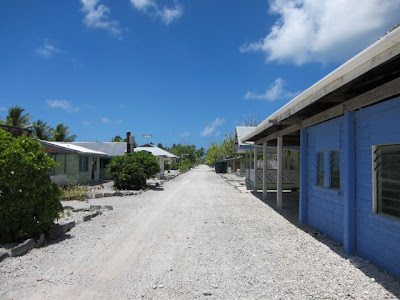Tetautua Village, on the windward side of Penrhyn. Elias and Eric are standing so far from the local kids because we had
just landed in the village for the first time, and immediately someone wanted to pose all the kids for a picture, before they had interacted at all. Poor Elias, we throw him into some pretty trying situations: 'Here's a village full of kids who have known each other their whole lives and speak a language that you don't know. Go have a play, we'll be leaving in a couple hours.' He acquits himself pretty well.
Galactic at anchor in Penrhyn.
The first thing that people in Tetautua wanted to do was trade. They were restrained about it, and we had to ask what they might be interested in trading for. After we had been around for a few days, the scale of what they needed began to dawn on us. They needed tools, and line for catching tuna, and small hooks for fishing the reef, and sunglasses, and t-shirts, and wetsuits, and baking powder, and flour, and rice, and petrol, and thongs/flip-flops, and cotter pins, and ibuprofen, and neosporin and lord knows what else. As near as we could figure out, the last ship visit had been five months earlier.
We've been the beneficiaries of a lot of gifts in other places in Polynesia, so we figured this was our chance to just give people a few gifts without worrying about any quid pro quo of trading. And there was clearly no point in taking any flour or petrol to the relative Land of Plenty that is American Samoa when those things were needed so badly on Penrhyn.
Of course, people reciprocated.
Matasa with a fan that she made for Alisa. (If anyone from Tetautua reads this, I hope you'll forgive my spelling and other errors!)
Seitu Marsters, the patriarch of one of the Tetautua families, took me lobstering with his nephew Boss Wallen and grandson Taatai Marsters. We only got one lobster, and of course they insisted that I take it - the generosity of the people there was really astounding. We were also given plenty of fish and chicken and coconuts and papaya during our stay.
Elias with a breakfast of lobster tail and coconut. "We're living large," he said.
Taina and her husband Penui gave Eric this shell necklace.
So the exchange of goods was one part of the visit. But what I really loved was the chance to just spend time with people. Penrhyn is real deal Polynesia - the 160 people on the island speak a unique language (Mangarongaro), they live a semi-subsistence lifestyle, and the ten or so yachties that have visited Tetautua this year are the full extent of local tourism.
The main street of Tetautua village. Migration to New Zealand and Australia has shrunk the population dramatically, and there are as many empty houses as full.
A couple of thatch-roofed houses are still in use.
Tamu Tapaltau (and Eric).
Seitu is on the far right.
There were a couple times when it was just me with Penryhn Islanders - lobstering at night, or skiffing over the village of Omoka for the day so that I could check us out with Customs and Immigration before we left. There was a lot of sitting around and listening to people talk Mangarongaro during those times. The language has a querolous, argumentative sound to it. I loved following the emotional flow of the conversations by just watching the play of expressions across everyone's face.
And when I tired of listening to a conversation that I couldn't follow, I looked out to the coconut palms blowing in the trades under the blue blue sky, and felt the slow river of time flowing over the atoll, this place where people are rich in time.
We went to church on Sunday (well, we went to one of the three services that day), which is a very yachtie thing to do.
The singing was powerful - keening women, stentorian men, harmonies that were strident enough to sit just this side of beautiful, and intricate timing. Good stuff. Matasa lent Alisa the hat.
And we went to the celebration for the dedication of the refurbished school. This was a big deal, with visiting dignitaries from Omoka giving speeches, letters from the government in Rarotonga being read, more beautiful singing, dancing by the kids, and a feast.
People gave us flowers to wear for the event and treated us as VIPs, insisting that we eat before them.
Alisa and Roriki Marsters at the ceremony.
I had been distracted by some headscratcher of a boat job that morning, and to my chagrin had forgotten to wear a collar to the event. Dressing to the locals' standard for happenings like this is very much a part of my traveller's ethos!
Well, it's late here, and I'm not sure I'm summarizing our stay very well. Suffice it to say that we were in Penrhyn for only a week, but that in that time we got to know some people living lives very different from ours. Those people were remarkably welcoming to strangers, and we got glimpses of their lives as being as complicated and nuanced as those of any of our peers, albeit in a setting that appears deceptively simple to a visitor. I hope we go back some day!
~~
Hmmm, I didn't even mention the sharks.
The lagoon is alive with sharks - Elias is feeding them some galley scraps here.
The end.



































